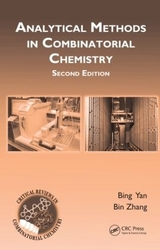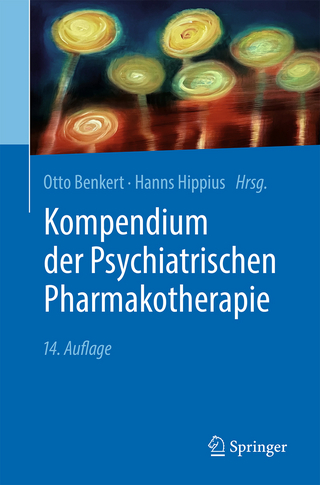
Analytical Methods in Combinatorial Chemistry
Crc Press Inc (Verlag)
978-1-56676-809-2 (ISBN)
- Titel erscheint in neuer Auflage
- Artikel merken
This volume summarizes most analytical technologies that are applied to solving various problems in broad areas of combinatorial chemistry: chemistry optimization, library synthesis, lead selection, and lead optimization. It also suggests many avenues for further research, especially the need for major breakthroughs to resolve the incompatibility between parallel synthesis and the serial analysis and purification.
Filling the tremendous need for analytical methodologies in various phases of combinatorial chemistry, this book will be a necessary addition to the library of anyone using combinatorial chemistry. While there are several resources available on the subject, there are no other books that deal specifically with analytical issues in combinatorial chemistry. Not only an ideal companion to the comprehensive reference books used by chemists in combinatorial chemistry, it is a timely textbook for university and graduate students, introducing them to the updated applications of modern analytical technologies in the rapidly growing field of combinatorial chemistry.
From the Preface:
This book is organized according to the operation process of combinatorial chemistry starting with the description of the basic properties of solid supports and their effects on solid-phase organic reactions in Chapter 2. Chapters 3-5 describe analytical methods routinely applied to the tedious process of reaction optimization. These techniques are various FTIR and Raman methods, MS, NMR, UV-Vis, fluorescence, and other analytical methods. . . . Then the discussions move to the analytical control of the library quality in Chapter 6. The various methods for selecting active lead components from combinatorial libraries and the ways to reveal their structure or identity are discussed next in Chapter 7. . . . The applications of analytical methods in the optimization of the in vitro activity and physicochemical properties of lead compounds are then illustrated in Chapter 8. . . . Some promising new technologies and future perspectives are presented in Chapter 9.
Preface
Acknowledgments
Analytical Issues in Combinatorial Chemistry
Combinatorial Chemistry
Synthesis Methods
Analytical Challenges
An Examination of the Resin Support
Physical Properties of Resins
Effects of Swelling of Resin
The Effects of Support Solvation on SPPS
Summary
Solid-Phase Reaction Optimization Using FTIR Methods
Comparison of FTIR and Raman Techniques
The Monitoring of Reactions on Polystyrene-Based Resin
The Monitoring of Reactions on PS-PEG Resins: Comparing the Reaction Rate on PS and PS-PEG Resins
The Monitoring of Reactions on Multipin Crowns
Summary
Reaction Optimization Using MS and NMR Methods MS Methods
NMR Methods
Summary
Reaction Optimization Using Spectrophotometric, Fluorometric and Other Methods
Qualitative Analysis of Amines
Quantitative Analysis of Amines
Quantitative Spectroscopic Methods for OrganicFunctional Groups
Combustion Elemental Analysis Methods
Electrochemical Methods
On-Resin X-Ray, EPR, and Fluorescence Methods
Summary
Quality Control of Combinatorial Libraries
Analysis of Discrete Compound Libraries
Analysis of Pooled Libraries
HPLC For Analyzing Compounds from Discrete and Mixture Libraries
Summary
Selection of Active Compounds from Combinatorial Libraries
In-Solution Screening of Combinatorial Libraries
Affinity Selection of Lead Compounds by Mass Spectrometry
Affinity Capillary Electrophoresis
Affinity NMR
Other Affinity Selection Methods
Encoding Methods
Summary
Optimization of Lead Compounds
Lead Compounds and Lead Optimization
Optimizing the in vitro Activity: SAR by NMR
Optimizing Physicochemical Properties
Summary
Final Thoughts and Future Perspectives
| Erscheint lt. Verlag | 5.1.2000 |
|---|---|
| Reihe/Serie | Critical Reviews in Combinatorial Chemistry |
| Verlagsort | Bosa Roca |
| Sprache | englisch |
| Gewicht | 658 g |
| Themenwelt | Medizin / Pharmazie ► Medizinische Fachgebiete ► Pharmakologie / Pharmakotherapie |
| Naturwissenschaften ► Chemie ► Analytische Chemie | |
| Naturwissenschaften ► Chemie ► Organische Chemie | |
| Technik ► Umwelttechnik / Biotechnologie | |
| ISBN-10 | 1-56676-809-8 / 1566768098 |
| ISBN-13 | 978-1-56676-809-2 / 9781566768092 |
| Zustand | Neuware |
| Haben Sie eine Frage zum Produkt? |
aus dem Bereich



